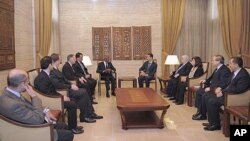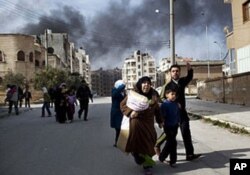Former U.N. Secretary-General Kofi Annan, now in Syria as an envoy for the Arab League and the United Nations, met with Syrian President Bashar al-Assad Saturday in Damascus, as Arab foreign ministers gathered in Cairo to discuss the Syrian crisis. Mr. Assad is reported to have pledged an “honest effort” to achieve peace in his country, but said he would not consent to any talks with his political opponents, whom he describes as “armed terrorist groups, spreading chaos and violence.”
At the Arab League, Qatar and Saudi Arabia are demanding concrete action to curtail the bloodshed in Syria. The league's secretary-general, Nabil al Arabi, and Russian Foreign Minister Sergei Lavrov jointly called for dialogue between the opposing sides in Syria.
Forces loyal to the Syrian government shelled the northern town of Idlib Saturday at the same time that President Assad was meeting in Damascus with Kofi Annan, the peace envoy from the Arab League and United Nations.
Witnesses in Idlib said they came under attack for hours, and that some of the shellfire was heavy. Government tanks also entered the city.
President Assad is said to have promised Mr. Annan that he would support any “honest effort” to work for peace. However, he also said he would reject any contact with opposition groups. Mr. Assad is quoted as saying no political talks could take place while "armed terrorist groups", his government's term for much of the opposition, are "operating and spreading chaos and terror.”
The Arab League, working through its special envoy Annan, is seeking a diplomatic solution to stop the violence, despite strong criticism from Qatar, Saudi Arabia and Syrian opposition groups themselves. Mr. Annan insisted that the first step towards peace is to stop the bloodshed and allow assistance to reach suffering civilians. "The first thing we need to do is to do everything we can to stop the violence and the killing, to facilitate humanitarian access and ensure that the needy are looked after," he said.
A five-point Arab League peace plan, announced at a news conference in Cairo, calls for a cessation of violence, deployment of independent observers, allowing the free flow of humanitarian aid, refraining from foreign intervention, and supporting Kofi Annan's mission.
Qatari Foreign Minister Sheikh Hamad bin Jassem ben Al Thani has consistently pressed the Arab League for more action on the Syrian crisis. He argues that the league needs to take more strenuous action.
He says the Arab countries have a moral responsibility to put a stop to the programmed daily killing in Syria and to protect the Syrian people. He also calls on fellow Arabs and the international community to send a peace-keeping force to Syria, and to tell the Syrian regime that the world's patience is exhausted by its arguments and ugly practices.
Saudi Foreign Minister Saud al-Faisal also condemned what he calls a tepid response to the crisis in Syria, by both Arab states and the international community. He says Russia and China's decision to veto a U.N. Security Council resolution on Syria gave the Syrian regime license to continue its brutal practices.
Russian Foreign Minister Sergei Lavrov said in Cairo that now is not the time to assess blame for the world's failure to stop the carnage in Syria. "We shall not really engage in discussing who is to blame. This could be done later by the authorities, by international structures who are empowered to do this. But today, the most urgent task is to end all violence, irrespective of where it comes from," he said.
Joshua Landis, who is head of the Middle East Studies program at the University of Oklahoma, says the Assad regime thinks it is winning the battle against the opposition, and that both sides' unwillingness to compromise paves the way for a bleak future in Syria.
“This is a zero-sum game. There isn't a compromise that can come out of this that I can see. Once Assad steps aside, the entire edifice of the regime is going to crumble. ... There's very little that can take the place of the Syrian Army or the Syrian government, and that has people wringing their hands in Syria. They don't see a way out of going down a very dark tunnel, which is in the direction of what happened in Iraq or what happened in Lebanon during the darkest period of the civil war," he said.
Landis foresees a growing cascade of defections from the upper echelons of the Syrian regime, but argues that President Assad's Alawite allies are not likely to desert him. “They understand,” Landis says, “that they need to hang together or be hanged apart.” He also paints a somber picture of an increasingly sectarian conflict: “It takes a long time for people who've lived together in relative harmony for decades to stop associating with each other and put hate in their hearts, but that's what we're going to see.”
| Join the conversation on our social journalism site - Middle East Voices. Follow our Middle East reports on Twitter and discuss them on our Facebook page. |





